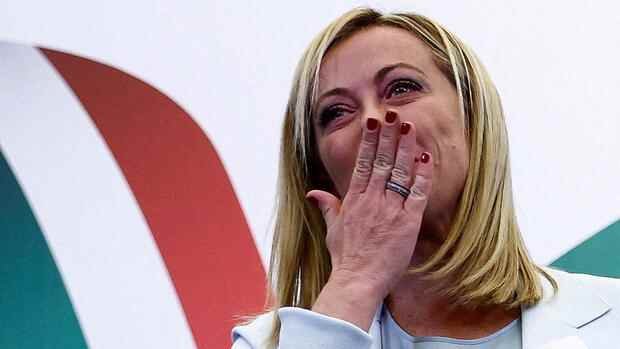Rome Giorgia Meloni and her Fratelli d’Italia party have clearly won the parliamentary elections. The post-fascists got 26 percent of the votes on Sunday. The alliance with Matteo Salvini’s right-wing Lega and Silvio Berlusconi’s right-wing conservative Forza Italia has a clear majority in both houses of parliament.
How exactly is it going on in Italy now? How long will it be before the right can take over the government, what hurdles are there for Meloni and her comrades-in-arms?
The constitution stipulates that parliament must be convened no later than 20 days after the election. The deadline for this is October 13th. Before that happens, however, the 600 newly elected parliamentarians (200 in the Senate, 400 in the Chamber of Deputies) have to form factions. When Parliament is first convened, the Presidents of both chambers are elected.
Top jobs of the day
Find the best jobs now and
be notified by email.
2) Who proposes the head of government?
After the first parliamentary session, it is time for the president, who has more power in Italy than the federal president in Germany: Sergio Mattarella will summon the leaders of the parliamentary groups, the top candidates of the parties and the former presidents of the parliamentary chambers to the Quirinal Palace to discuss the future government to advise. According to the current schedule, this should happen on October 17th and 18th.
The right to propose lies solely with Mattarella, which is enshrined in the constitution. There is no automatism whereby the party with the strongest election result automatically nominates the prime minister.
Sergio Mattarella and the leaders of the parliamentary groups, the leading candidates of the parties and the former presidents of the chambers of parliament will discuss the future government.
(Photo: AP)
Given the clear majority in both houses of parliament, it would be an extremely big surprise if Mattarella were to pull a candidate other than Meloni out of the hat. In the Senate, their legal alliance provides 115 of the 200 seats, in the Chamber of Deputies 237 of 400.
3) When will Giorgia Meloni take office?
Once the President has decided on a designated Prime Minister – in the current case it is likely to be a female Prime Minister for the first time in history – he gives the order to form a government. Meloni then has to present a list of her planned cabinet. If Mattarella accepts this list, he can swear in the government.
The new government still has to pass a confidence vote in Parliament within ten days of being sworn in. Because of the comfortable majority in both chambers, this step would only be a matter of form.
All in all, this whole process will take at least a month, believes Lorenzo de Sio, a political scientist at Rome’s Luiss University. “It could even be November before Meloni is in office.”
A look at the formation of governments in the past also shows that it has never taken less than 25 days from the vote. In the last election in 2018, the negotiations dragged on for a particularly long time: 88 days passed before the alliance of the right-wing Lega and the left-wing populist Five Star Movement was in office.
4) What are the most pressing problems?
The new government will immediately have important deadlines on the table. One even elapses before the negotiations with Mattarella: on October 15, Italy, like all other countries, has to send the draft budget plan for the coming year to the EU Commission.
Mario Draghi led the previous government.
(Photo: IMAGO/ZUMA Press)
In Italy it is hoped that the EU could be a little more flexible with the schedule because of the election. Still Prime Minister Mario Draghi has already made it clear that the future political guidelines of the budget must be made by the new government – and no longer by him.
The freshly elected cabinet must also quickly deal with the high energy prices. Mitigation effects for families and tax relief for companies will soon expire, new aid packages are needed quickly to cushion the additional burdens this winter.
>> Read here: The European trend is feminine, powerful – and right-wing
At the same time, 43 goals and reforms still have to be achieved by the end of the year in order to receive the third tranche of the EU’s reconstruction fund – at least 21.8 billion euros.
Among other things, the employment offices must be strengthened, the water supply network modernized and the judicial reform pushed forward. However, Meloni announced several times during the election campaign that he wanted to discuss the use of the funds. The rescue fund was drawn up during the pandemic, but the war in Ukraine means that more resources are now needed for energy policy.
More: Russia is a point of contention: Among Italy’s election winners, Berlusconi and Salvini are two declared Putin friends
